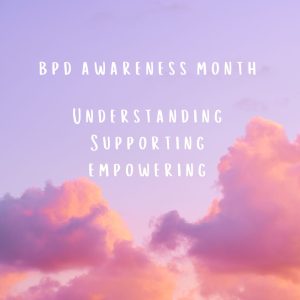Borderline Personality Disorder (DSM 5)
- Emotionally Unstable Personality (WHO)
- Emotional Regulation Disorder (TARA-APD)
- Emotional Dysregulation Disorder (TARA-APD)
- Impulse Disorder (John Gunderson)
- Interpersonal Regulatory Disorder (TARA-APD)
- Post Traumatic Personality Disorganization (Carolyn Quadrio)
Did you know that a group of symptoms/experiences could have so many names?
Before the release of the 5th edition of the Diagnostic and Statistical Manual of Mental Disorders (DSM 5) in May 2013, the Treatment and Research Advancements National Association for Personality Disorders (TARA-APD) campaigned to have the name “Borderline Personality Disorder” (BPD) changed in the DSM 5. According to TARA-APD, the name “Borderline Personality Disorder” carries with it a great stigma and is also incorrect in its meaning. The name change campaign was unsuccessful so possibly until the next DSM, the name Borderline Personality Disorder is here to stay.
Signs of BPD can be seen in the DSM I (1952) under Emotionally Unstable Personality and in the DSM II (1968) under Explosive Personality. Borderline Personality Disorder, the name, did not exist until the DSM III in 1980. It was originally believed that these individuals overlapped with schizophrenia, non-schizophrenic psychoses, and neuroses such as anxiety and depression. This perceived overlap is what led to the term “borderline”. Research into BPD over the years has demonstrated that it is its own unique diagnostic entity despite co-occurring with other DSM disorders like addiction, depression, ADHD and PTSD. Some studies clearly indicate that BPD has nothing to do with schizophrenia in the way that originally gave it its name. Wanting a name that accurately describes the experiences is the driving force behind the name change. BPD is so heavily discriminated against that a person can find entire websites devoted to bashing Borderlines and mental health care practitioners even refuse to work with individuals who experience BPD or provide the diagnosis (as I experienced with my most recent psychiatrist who said I do not experience BPD and diagnosed me with two other disorders and a description of my behaviour). The discrimination people with the BPD label face is another reason for wanting a name change.
On a personal level, I have no issue with the term Borderline. This is mostly because I have been fortunate enough to not have it used against me in ways that had negative consequences. When I tell people my Borderline diagnosis they are usually confused as to what it means. This has provided me with the opportunity to explain my experience in my own words instead of my label to doing it for me.
As an organization, Dialectical Living uses the DSM approved term BPD and also Emotional Regulation Disorder (ERD). We feel that ERD accurately represents the experience and we do advocate for the name change. We respect that each individual that comes to us has their own set of experiences which determine their identity. We aim to be inclusive of all of these identities whether they use BPD, ERD or something completely different.
What are your thoughts on BPD and the proposed name changes that have been put forward?
Sources:
Borderline Personality Disorder Demystified- http://www.bpddemystified.com/what-is-bpd/history/
Carolyn Quadrio- https://www.researchgate.net/publication/295309096_Axis_oneaxis_two_A_disordered_borderline
DSM I 1952 (PDF)
DSM II 1968 (PDF)
Elizabeth Bogood– https://web.archive.org/web/20150502181810/http://www.borderlinepersonalitytoday.com/main/label.htm
John Gunderson (2005)- http://bpdfamily.com/pdfs/understanding.pdf
Valarie Poor (2001)- http://www.tara4bpd.org/how-advocacy-is-bringing-borderline-personality-disorder-into-the-light/





